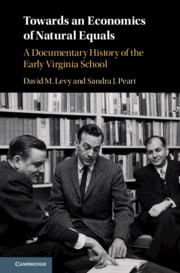Book contents
- Towards an Economics of Natural Equals
- Frontispiece
- Towards an Economics of Natural Equals
- Copyright page
- Dedication
- Contents
- Figures
- Tables
- Preface
- Acknowledgments
- 1 Why the Virginia School of Political Economy Matters
- 2 James Buchanan and the Return to an Economics of Natural Equals
- 3 “Almost Wholly Negative”: An Early Reaction to the Virginia School
- 4 “The Economics of Universal Education” and After: From Friedman to Rawls
- 5 Virginia Political Economy and Public Choice Economics
- 6 The Individuals and Their Connections
- 7 The Role of the Earhart Foundation in the Early Virginia School
- 8 The Virginia School and the Anti-democratic Right
- 9 Neoliberalism, the Virginia School, and the Geldard Report
- 10 Conclusion: Should the Virginia School be Restored?
- Select Bibliography
- Index
7 - The Role of the Earhart Foundation in the Early Virginia School
Published online by Cambridge University Press: 16 December 2019
- Towards an Economics of Natural Equals
- Frontispiece
- Towards an Economics of Natural Equals
- Copyright page
- Dedication
- Contents
- Figures
- Tables
- Preface
- Acknowledgments
- 1 Why the Virginia School of Political Economy Matters
- 2 James Buchanan and the Return to an Economics of Natural Equals
- 3 “Almost Wholly Negative”: An Early Reaction to the Virginia School
- 4 “The Economics of Universal Education” and After: From Friedman to Rawls
- 5 Virginia Political Economy and Public Choice Economics
- 6 The Individuals and Their Connections
- 7 The Role of the Earhart Foundation in the Early Virginia School
- 8 The Virginia School and the Anti-democratic Right
- 9 Neoliberalism, the Virginia School, and the Geldard Report
- 10 Conclusion: Should the Virginia School be Restored?
- Select Bibliography
- Index
Summary
The Thomas Jefferson Center Annual Reports credit the Volker Fund for a founding grant and the Earhart Foundation for providing critical support to graduate students. The Rockefeller Foundation supported Nutter’s NBER Soviet growth project and provided Tullock’s initial fellowship at the TJC. The Earhart Fellowship program has been neglected in previous histories of this period, perhaps because it was decentralized. The Foundation selected faculty sponsors to award graduate fellowship to students of their choice. The chapter presents the history of the fellowship program by major departments over the whole of the foundation’s existence. Harvard, Berkeley, and Columbia had fellows a year before the University of Chicago but Earhart fellowships at those institutions declined over time while those at Chicago and Virginia survived. Thus, the association of the Earhart Foundation with Chicago seems to be a result of a survival bias. The number of sponsors or fellows who were president of the American Economic Association or Nobel laureates is also remarkable. Earhart funded Nutter’s “rational debate” series exemplifying government by discussion at the early Virginia School.
Keywords
- Type
- Chapter
- Information
- Towards an Economics of Natural EqualsA Documentary History of the Early Virginia School, pp. 195 - 215Publisher: Cambridge University PressPrint publication year: 2020



